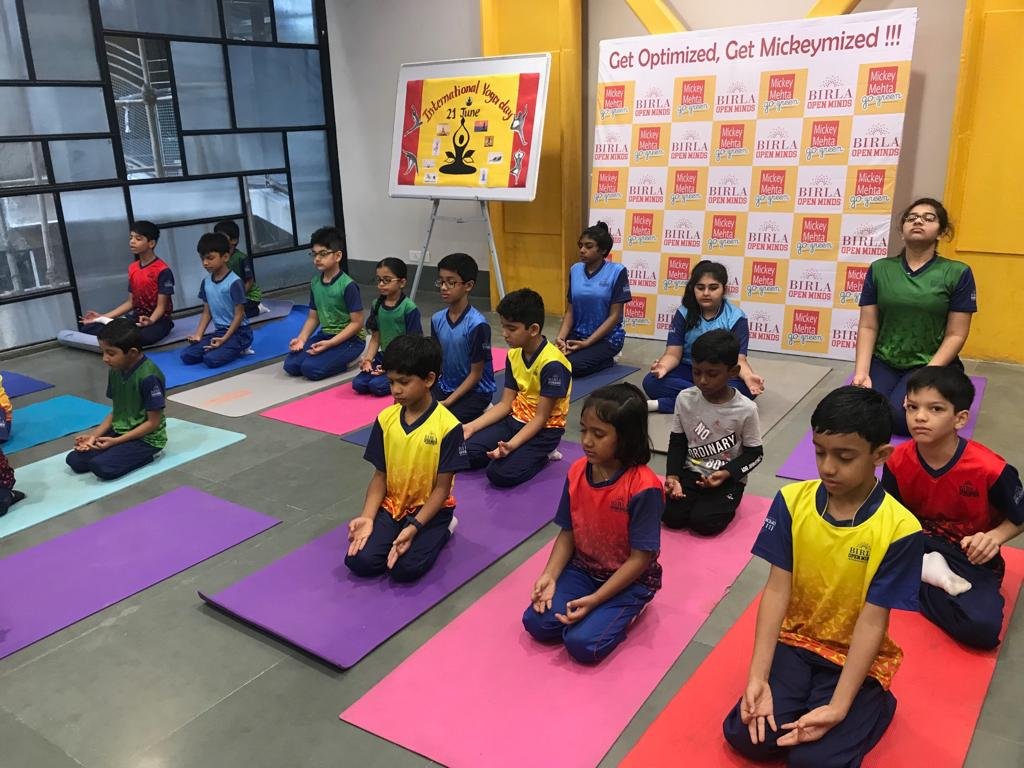Primary School Curriculum
The Primary Years curriculum focuses on boosting the social, emotional, spiritual, physical, motor, and cognitive development of each learner.
Scholastic and Co-scholastic Approach in Primary Years
The scholastic approach primarily focuses on academic or subject-based learning and aims to develop learners’ knowledge, understanding, and skills in these core subjects.
We begin the journey with the following subjects:
o English Language Arts
o Hindi
o Third Language
o Environmental Studies
o Mathematics
o Information and Communication Technology
The co-scholastic approach complements the scholastic approach by focusing on the holistic development of learning beyond academics and aims to foster well-rounded individual
The co-scholastic subjects are:
o Performing Arts
o Visual Arts
o Physical, Social, Health Education
o Physical Education, Yoga and Sports (SPEED)
o Soul Science



The focus of the curriculum is to connect what is taught and learned in various subjects to life outside the classroom.
At BOM, the curriculum is designed and developed to fit the necessities, interests, capabilities and learning styles of each child. BOMISites are at the centre of our educational processes and systems. The curriculum, through each of its parameters, focuses on boosting the social, emotional, spiritual, physical, motor and cognitive development of each child.
The Primary Years curriculum is carefully designed to nurture the child in all dimensions of his/her life, to bring out the essence of a holistic being. The curriculum aims to foster the development of key skills in communication, problem-solving, citizenship, critical thinking, inquiry, investigation, analysis, social awareness, personal awareness and collaboration.

In the Birla Open Minds, the scholastic and co-scholastic subjects go hand in hand, assisting the BOMISites in achieving excellence. Our Primary Years curriculum is age-appropriate. It is based on learning outcomes and progressive teaching, integrating concepts, processes and ways of thinking drawn from the diverse disciplines of subject areas.
We begin the journey with the following subjects:
- English Language Arts
- Hindi
- Third Language
- Environmental Studies
- Mathematics
- Information and Communication Technology
The co-scholastic subjects are :
- Performing Arts
- Visual Arts
- Personal, Social, Health and Economic (PSHE) Education
- Physical Education, Yoga, and Sports (SPEED)
- Soul Science
Six integrated themes help the learners in Grade I-IV to make meaningful connections through the immersive process where a thematic focus straddles all areas of learning; the duration of each theme being 4-6 weeks.
At Birla Open Minds, we conduct 'Filler Weeks' and 'Subject Weeks' to further develop various skills — reading, writing, listening, speaking, mathematical and scientific skills. Research on how the brain learns best, developmental appropriateness, the theory of Multiple Intelligences and the National Curricular Framework have guided our curriculum, while the curricula for Grades 1-4 have been thoughtfully planned to ensure that each child enjoys these years in learning, discovery and creativity.
Our learning environment is an affirmative and enabling one. Bright, airy, learning spaces, creative learning centres, well-stocked libraries, integrated laboratories, ICT laboratories, and exciting, interactive display boards, create an environment that catalyses the teaching-learning process.
Assessment is an ongoing process. It guides the learners in their pursuit of excellence. Theme End Assessments and Term End Assessments ensure timely feedback on the degree of achievement of a child as well as his/her grade-level outcomes. Such assessments are meant to guide teachers and parents in providing the required support in a timely and effective manner. The progress of each child is shared through detailed report books along with a portfolio of documented work, making learning visible to all.
All these thoughtful processes ensure the fulfilment of our ultimate goal of teaching in a manner in which all students learn and develop skills such as reading, writing, listening, speaking, communication, problem-solving, citizenship, collaboration, leadership, and creative and critical thinking skills.
